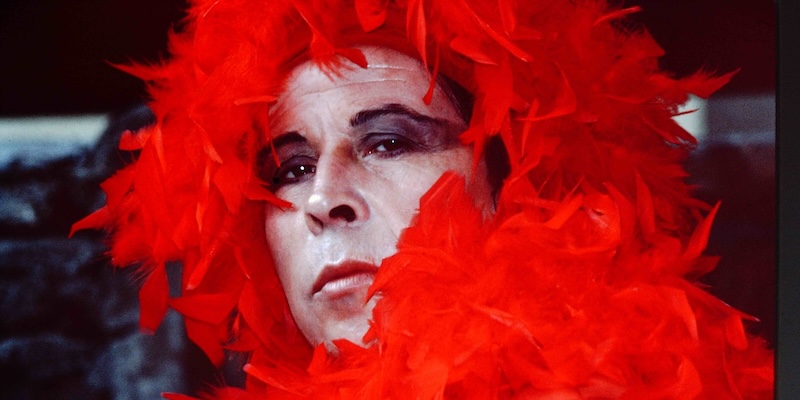
A Queer, Carnivalesque Vision of Chile’s Independence Day from Pedro Lemebel
From “A Last Supper of Queer Apostles: Selected Essays”
Join the party beneath the shoddy tent that’s already brimming with peepers, just like your bladder ready to explode if you don’t take a piss. And in the early morning frost, somewhere between excuse me and mind if I…?, behind the refreshment stall platforms, the bubbly stream lets loose, forming a chorus with the row of other weenies squeezed to bursting from so much celebrating. And someone at his side, pretty young from the looks of him, asks: Want me to get you off?
And he’s so lonely and bitter this Eighteenth that he doesn’t think twice but just gives the boy a wink of assent. And the teen hangs on to his willie like a suckling calf, provoking a wave of tenderness that makes him stroke the boy’s gelled bangs, mussing his hair in an ejaculating outburst and murmuring: Take it, chilito, eat it, it’s all yours.
And while the cumbia’s humming and the accordion’s grinding out mira como va, negrito, and hurried joints are smoked in a tumble of embers that for a second illuminates the boys’ faces, he falls, rolling down the ellipse of the park in a topsyturvy of baton twirlers, meat skewers, cocks, and posters of Mother Teresa, Verónica Castro, the Pope, the Colo-Colo soccer team, and all the saints who have been canonized by roadside merchant hawking.
There he lies, flung out on the grass, his open fly revealing his willie lolling like a drunk snake. Out of money because the sipping fairy nicked his entire paycheck as payment for services rendered.
The national holidays are like this, an effervescent inertia that unites our yearning to belong to wherever we are. To be at least a hair on the tail of a taxidermied Patagonian deer. Or the pointy tip of the star, anything that whiffs of Chile in order to feel at ease and munch on scraps of the barbecue that wafts only so many times a year from working-class backyards. For a few days, they stucco the buildings’ sallow complexions with color, draping the passageways and their dusty revelry with garlands.
It would seem like this ignored class of people should be laughing at this identity that’s been forced on them, transmitted via government trichomoniasis.
The plebes get their tiny allowance of happiness, which flutters in the flags they sew out of uneven fabric scraps. As if the sheer amount of proletariat red in this misshapen geometry might maroon that unreachable blue. As if that same roiling purple could then migrate into the white, chafing it into a violent rose. Playfully turning the flag’s pure colors into a flower stained by the rust on the walls.
It would seem like this ignored class of people should be laughing at this identity that’s been forced on them, transmitted via government trichomoniasis. As if the state, through these patriotic carnivals, were desperately trying to shore up the voice of a people whose culture was lost somewhere in all the Aiwa cassette players that sing on the street corners with Andalusian hoarseness, Mexican wails, and rock ‘n’ roll lyricism.
A supposedly shit-faced identity that hangs its hat on these flimsy symbols instead, which at this point in the century are imported from Japan, like patriotic birthday decorations that glow just briefly, on certain days of the year. And once the euphoria ends, the brightness of that same September sun fades away, returning the city’s inhabitants to their commutes, as they make their way back to work, a little bit sadder, their shoes worn out from dancing.
______________________________

From A Last Supper of Queer Apostles by Pedro Lemebel, to be published on May 28, 2024 by Penguin Classics, an imprint of Penguin Publishing Group, a division of Penguin Random House, LLC. Copyright © 1995, 1996, 2013, 2020 by Pedro Lembel. Translation copyright © 2024 by Gwendolyn Harper.
Pedro Lemebel
Pedro Lemebel (1952–2015) is considered one of the most important queer writers of twentieth century Latin America. Born in Santiago, Chile, he became a renowned voice of Latin American counterculture throughout the Pinochet dictatorship and its aftermath. In 1999 he was awarded a Guggenheim Fellowship to compile stories of homosexuality in Chile, and in 2013 he received the José Donoso Prize. His only novel, My Tender Matador, was adapted in 2020 into a critically-acclaimed film by Chilean director Rodrigo Sepúlveda. He is also the author of A Last Supper of Queer Apostles: Selected Essays.



















